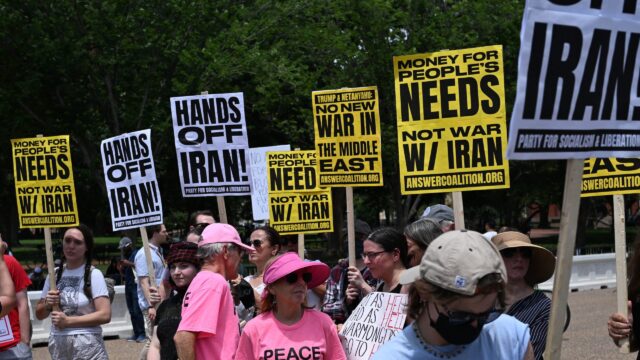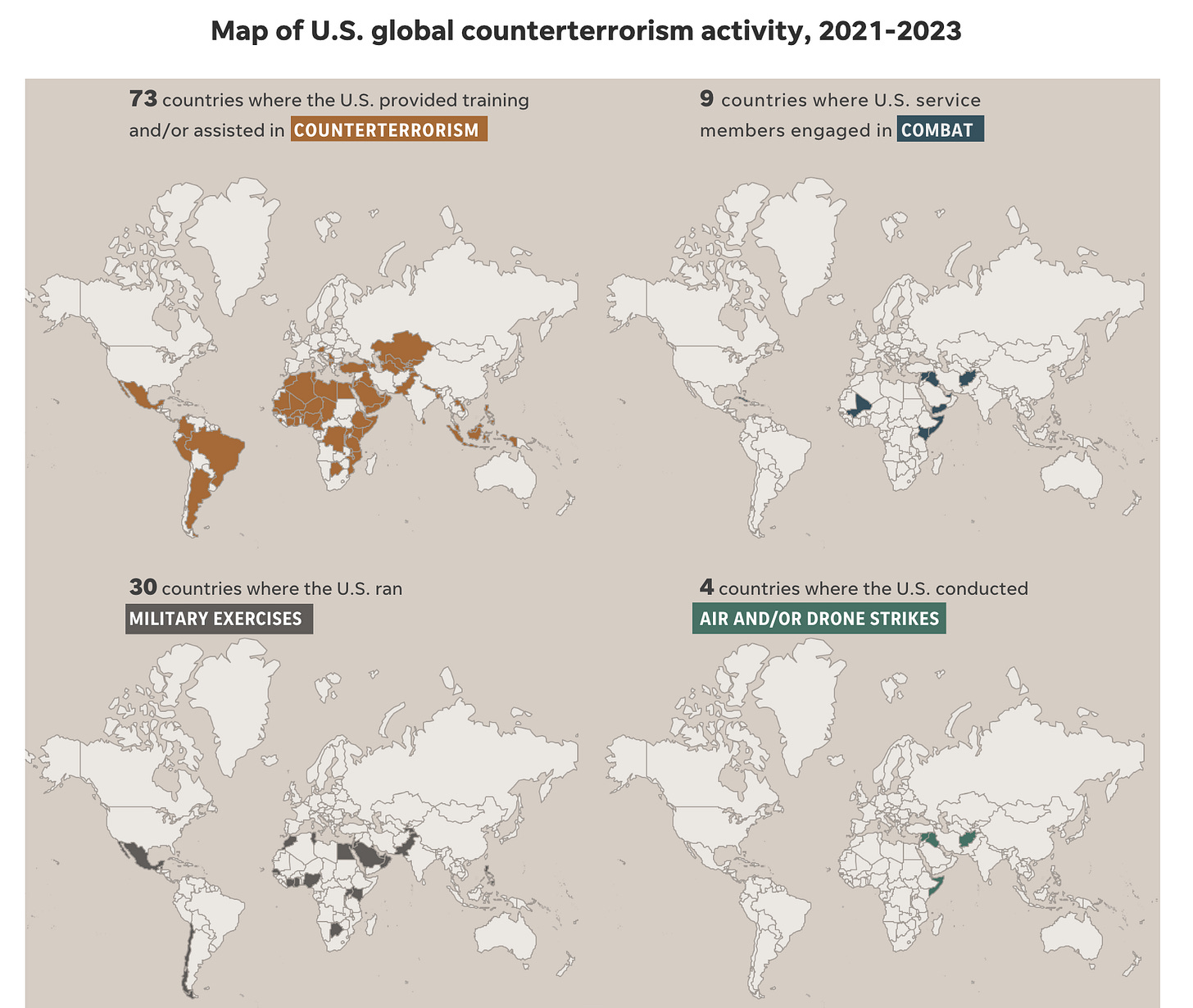Divided America is Vulnerable in War

Donald Trump’s decision to bomb Iran has triggered a maelstrom of destabilizing political pressures. Can we fight and fracture at the same time?
American B-2 bombers struck three sites in Iran Saturday night, the denoument of a crisis triggered in late May, according to the New York Times:
In late May, [Trump advisors saw] intelligence that made them concerned that Israel was going to move ahead with a major assault on Iran… And in the two weeks leading up to the Camp David meeting, Mr. Trump’s top advisers met multiple times to get on the same page about what the menu of potential options might be… Monday, June 9, Mr. Trump got on the phone with Mr. Netanyahu. The Israeli leader was unequivocal: The mission was a go.
Mr. Netanyahu laid out his intentions at a high level, according to three people with knowledge of the call. He made clear that Israel had forces on the ground inside Iran. Mr. Trump was impressed by the ingenuity of the Israeli military planning… After he got off the call, he told advisers, “I think we might have to help him.”
This is already a microcosmic example of everything you worry about with Donald Trump. No one boasts more about strength, and the importance of appearing strong, than Trump. Forget the cavalcade of roided-out wrestler types in his entourage, and remember what he said back in 1990 about the Chinese suppression of the Tiananmen revolt: “They were vicious, they were horrible, but they put it down with strength. That shows you the power of strength.” At times, he seems to follow his own advice, but now? When the baddest military on the block goes to war, it should go on its own timeline. We should never be blackmailed into escalation by a yapping-dog client state. Trump grasps this with Volodymyr Zelensky, an actor in a commando sweater. But he went weak in the knees around Bibi Netanyahu, and here we are.
Realizing the situation is not about optics, the optics are nonetheless terrible. Trump last year ran on being “the only president in generations who didn’t start a war.” Along with a promise to immediately “stop all government censorship,” the idea that Trump Alone would wave off the hawks in the Pentagon and State Department who urge us into forever wars was central to his platform:
Now the administration is acting like a coked-out version of the Bush White House, offering premature “mission accomplished” bromides after its porn-titled bomb run (“Midnight Hammer” might as well have been “Operation Throbbing Man-Shaft”). Defense chief Pete Hegseth boasted “American deterrence is back” before we had any idea if Iran planned to make good on its retaliatory threats, which Trump already promised would be “met with even greater force than what was unleashed today.” The possibility that all this will backfire and we’ll end up lashed to Israel in an “existential” forever-war of exactly the type Trump promised to reject is real.
Trump made a tactical mistake, but the bigger problem is political. At a different time in our history (even Trump’s first term, when a decision to bomb Syria had everyone from Brian Williams to Van Jones orgasming over American military prowess), America’s consensus-building mechanisms would be working overtime to rally the population. Ostensible European allies, who have a bigger strategic interest than we do in this matter, would be doing the same. This would all add to pressure on Iran and make the gambit less likely to end in disaster. That moment is gone. Reactions to “Midnight Hammer” have been bonkers even by the standards of the Trump era. We may be a country that can no longer go to war for any reason without risking internal collapse. Is that a good thing? Maybe, maybe not:
Start with the Democratic Party’s talking points, astonishing at minimum on the level of hypocrisy. Elected officials are going with arguments about Constitutionality, and appear to be using the moment to prepare an impeachment argument.
Alexandria Ocasio-Cortez, who’s been mentioned as a presidential candidate, tweeted, “The President’s disastrous decision to bomb Iran… is a grave violation of the Constitution and Congressional War Powers… absolutely and clearly grounds for impeachment.” Illinois Democrat Sean Casten concurred, saying “No president has the authority to bomb another country that does not pose an imminent threat to the US without the approval of Congress. This is an unambiguous impeachable offense.” Minority Leader Hakeem Jeffries left out the word “impeach” in his statement, but he’s saying something similar: Trump “failed to seek congressional authorization for the use of military force” and “shoulders complete and total responsibility for any adverse consequences that flow from his unilateral military action.”
I wrote about this political tactic in Rolling Stone exactly six years ago, on June 19, 2019, after Iran shot down an American drone. Complaints about illegality and/or constitutionality of military acts by the minority party have been reflex for 20 years:
This has been a running theme with both parties since 2001… When Republicans are in power, Democrats complain they haven’t been consulted about the use of force, as they did following an increased troop deployment to Iraq in 2007 (Joe Biden even said this was an impeachable offense). Republicans were shocked, shocked that the Obama administration attacked Libya without congressional approval back in 2011, and again when Obama bombed Syria in 2013, and again when Obama bombed Syria in 2016 (Republicans also criticized Obama for asking for congressional permission in a 2014 bombing campaign). The tables turned again in 2017, when people like Nancy Pelosi said Donald Trump’s decision to bomb Syria “needs oversight,” and in 2018, when congressional Democrats criticized Trump again for bombing Syria without their permission.
Now, with Iran, Democrats are doing the same dance…
Going to war against a foreign country without congressional approval was once illegal, probably should be again. On the other hand, both parties after 9/11 voted to pass the Authorization for Military Force Against Terrorists (AUMF), which gave presidents a blank check for war without congressional approval, against any nation or group deemed to have aided in the planning of 9/11 or harbored connected terrorists. It passed 98-0 in the Senate and 420-1 in the House and was later invoked to justify operations in at least 22 countries, including against groups that didn’t exist on 9/11. Barack Obama and George Bush alone invoked it to justify attacks in “Afghanistan, the Philippines, Georgia, Yemen, Djibouti, Kenya, Ethiopia, Eritrea, Iraq, and Somalia.” Only when Trump flirted with the idea of war with Iran in 2019 did Congress attempt to revoke the AUMF, and even passed a bill ostensibly barring Trump from pursuing war with Iran. He just called it “insulting” and vetoed it.
Again, I think presidents should need the approval of Congress to go to war, but both parties voted to geld themselves more or less unanimously on this question in 2001, then during a period of expansionist euphoria let presidents run wild, to the point where voters didn’t even know where our military was deployed by 2016. Now they want to cry about War Powers, when we haven’t had a declared war since 1942? A Brown University “Costs of War” project map of where undeclared operations relying in part on the AUMF took place between 2021-2023 shows how transparent this is:

If Congress manages to muster the votes to override a veto and restore some order to a process that (clearly by design) has lacked any since the forties, mazel tov. I’d be for it, so long as it applied to every president, not just this one. If Democrats pursue impeachment on this basis after all the undeclared military insanities they’ve green-lit over the years (including everything from the Vietnam War to the deployment of ATACMS missiles into nuclear-armed Russia by a lame-duck cabbage last November), that’s different. A legislative call to stop both wars as unconstitutional would carry more weight. But much like the speech issue, we can’t get both sides to commit to a principle simultaneously, just to campaigns of selective restriction.
Another stunning development is the sudden rehabilitation of revolutionary Iran’s reputation. On one level or another, we’ve been in conflict with this Iranian government since the late seventies. If you want to backdate that to the overthrow of democratically elected Mohammed Mossadegh and his replacement with the Shah Reza Pahlavi in 1953, that’s fine. But Iran has been a near-constant belligerent ever since, from seizure of American hostages to the Hezbollah Beirut bombings to the “tanker wars” of the eighties (which included the sinking of an American warship) to ongoing sponsorship of terrorism and shipping lane disruptions and other problems. Even if one places blame for recent Iranian action on Western sanctions, in fact even if you tilt blame for every bloody incident since the fifties our way, Iran would still be a security concern.
We can argue about how best to deal with those concerns, but if we’ve reached a place where a country with a history of terror sponsorship and a “Death to America!” foreign policy is getting nuclear weapons doesn’t worry much of the country, or has become less of a worry than fears about our intramural politics, that might be a sign we’ve fully checked out of the defense game. I didn’t like the decision to bomb Iran, but as an American I feel like I should hope it was successful and that this puts off the nuclear issue for a while. It doesn’t look like many agree, however.
It’s become de rigueur among protesting groups that Iran now be folded into the same sympathetic camp as Gaza/Palestine, and calls from “peace” groups seem to want an end to every conflict but the one in Ukraine (Iran has been a primary Russian ally against Ukraine, but whatever). Media ripped conservative voters for selfishness in demanding that taxpayer money be spent at home instead of Ukraine, but those same outlets are running pics of suddenly ubiquitous “Money for people with needs, not War With Iran” signs. We even saw the bizarre spectacle of the L.A. County Sheriff’s office briefly issuing a release saying their “hearts go out” to the victims of the Iran bombings. Former Trump adviser Steve Bannon’s accusation that “there needs to be a thorough FARA investigation into Fox’s relationship with a foreign power” speaks to the extreme vibe shift now detectable across all political factions. This country is just too rife with intramural conflict to be anything but damaged by foreign war.
War was once a tool presidents used to galvanize populations, often cynically. Now it’s clearly just adding weight to fractures, not just between Democrats and Republicans but along fault lines within those parties. That’s more a pattern you’d see in failing states. Is that who we are?
